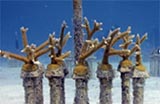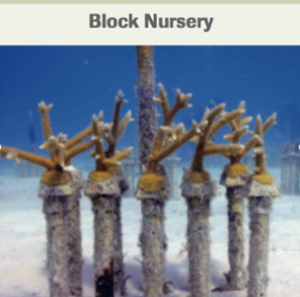Coral reef restoration through coral gardening
by Christina Vilmar, Marine Conservation Biology student
Many environmental and anthropogenic stressors have caused a worldwide decline in coral coverage. In the Caribbean, Acropora has experienced declines of 80-90% since the late 1980s, which decreases diversity, complexity, ecosystem function and economic services of the reefs.
A. palmata and A. cervicornis are listed as critically endangered by the IUCN Red List since 2008. Recently, coral gardening has been gaining attention as an effective tool for reef restoration to enhance natural coral recovery and rehabilitate degraded reefs. Coral gardening is the process of collecting coral biomass (generally by breaking off fragments), growing fragments in a nursery, and outplanting the reared corals on reefs. The goal is to create sexually reproductive colonies to promote recovery.
Collection of fragments does not significantly damage the donor and pruning can actually increase coral productivity. Transplantation projects worldwide are seeing survival and growth of outplants as well as natural recruits in areas with active restoration and sediment stabilization.
Despite the positive outcomes of current coral nursery projects and studies, it is important to remember that successful restoration cannot take place without effective management and removal of threats that caused the destruction. Coral restoration can help mitigate damage, but policy and enforcement are needed to reduce our negative impacts. Preservation of the natural habitat is the best choice, but coral gardening is a viable way to help repair the damage we have caused and aid in the recovery of coral reefs.
Lirman, D., Thyberg, T., Herlan, J., Hill, C., Young-Lahiff, C., Schopmeyer, S., Huntington, B., Santos, R., & Drury, C. (2010). Propagation of the threatened staghorn coral Acropora cervicornis: methods to minimize the impacts of fragment collection and maximize production Coral Reefs, 29 (3), 729-735 DOI: 10.1007/s00338-010-0621-6
Rinkevich, B. (2008). Management of coral reefs: We have gone wrong when neglecting active reef restoration Marine Pollution Bulletin, 56 (11), 1821-1824 DOI: 10.1016/j.marpolbul.2008.08.014





Wow, what a great thing to be doing. I read on the web that some fisherman were blowing up coral reefs in order to harvest some fish. Mankind is not doing a good job looking to the future. It’s seem like many selfish people are not thinking past their own life time on earth. Thank god for people like you.
Thanks for your kind words, Deborah, but please understand that we are just reporting on this technique and aren’t using it ourselves.